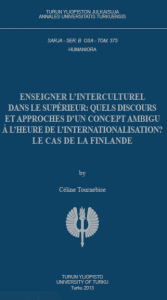Celine Tournebise will defend her doctoral thesis entitled “Enseigner l’interculturel dans le supérieur: quels discours et approches d’un concept ambigu à l’heure de l’internationalisation? Le cas de la Finlande” on 13.12.2013 in Metz France.
The thesis was co-supervised by myself and Guy Achard-Bayle.
This work has an important message for those of us who work on intercultural communication education in Finland (and elsewhere?): we seriously need to review the ways we teach about interculturality!
Abstract
The « intercultural » is rarely defined by researchers or media as it is perceived as transparent while its interpretations and applications vary in many ways. This leads to misunderstandings and ambiguous positioning. In parallel, several critics and reorientation propositions arise. I intend to define the scope of the concept and its integration in educational contexts. This study is based on the analysis of six focus groups involving lecturers (-researchers) specialised in intercultural communication in higher education in Finland. It reviews the different perceptions of ―the intercultural‖ that can be found through their discourses. I use discourse analysis from French authors, more particularly the theories of enunciation (Kerbrat-Orecchioni, 2009 ; Marnette, 2005) and an approach to dialogism inspired by Bakhtin (1977) who stated that all discourses include the voice of the Other (Rabatel, 2008; Vion, 2005). Mapping the presence of voices in the discourses of lecturers helped me demonstrate how these voices participate in the co-construction of their identity and what their impact on the teacher‘s conceptualization of interculturality is. The analysis revealed that a) discourses about ―the intercultural‖ are shared in spite of its polysemic definitions and approaches and b) the different representations of the concept can vary in the speech of the same teacher, showing contradictions that can be a problem when teaching a savoir-être (life skills) to learners. This study also aimed at finding the place of a renewed interculturality in Finnish higher education and intended to dissociate the image of the intercultural as it is promoted in the country from what is actually taught in practice: the latest and ongoing changes seem to have very little impact on the way these practitioners talk about the ―intercultural‖. I conclude asking the question of how the Finnish government can promote a coherent Intercultural Education without offering its teachers/researchers a training that could help them recognize the diverse diversities implied by a renewed interculturality. Keywords: Intercultural Communication, diversity, culture, Finnish Higher Education.
Click on the book cover below to access her work (in French)

